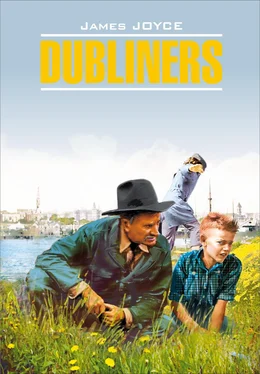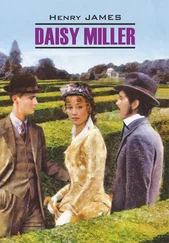Джеймс Джойс - Dubliners / Дублинцы. Книга для чтения на английском языке
Здесь есть возможность читать онлайн «Джеймс Джойс - Dubliners / Дублинцы. Книга для чтения на английском языке» — ознакомительный отрывок электронной книги совершенно бесплатно, а после прочтения отрывка купить полную версию. В некоторых случаях можно слушать аудио, скачать через торрент в формате fb2 и присутствует краткое содержание. ISBN: , Жанр: foreign_language, literature_20, foreign_prose, на английском языке. Описание произведения, (предисловие) а так же отзывы посетителей доступны на портале библиотеки ЛибКат.
- Название:Dubliners / Дублинцы. Книга для чтения на английском языке
- Автор:
- Жанр:
- Год:неизвестен
- ISBN:978-5-9925-0839-0
- Рейтинг книги:5 / 5. Голосов: 1
-
Избранное:Добавить в избранное
- Отзывы:
-
Ваша оценка:
- 100
- 1
- 2
- 3
- 4
- 5
Dubliners / Дублинцы. Книга для чтения на английском языке: краткое содержание, описание и аннотация
Предлагаем к чтению аннотацию, описание, краткое содержание или предисловие (зависит от того, что написал сам автор книги «Dubliners / Дублинцы. Книга для чтения на английском языке»). Если вы не нашли необходимую информацию о книге — напишите в комментариях, мы постараемся отыскать её.
Книга адресована студентам языковых вузов и всем любителям современной англоязычной литературы.
Dubliners / Дублинцы. Книга для чтения на английском языке — читать онлайн ознакомительный отрывок
Ниже представлен текст книги, разбитый по страницам. Система сохранения места последней прочитанной страницы, позволяет с удобством читать онлайн бесплатно книгу «Dubliners / Дублинцы. Книга для чтения на английском языке», без необходимости каждый раз заново искать на чём Вы остановились. Поставьте закладку, и сможете в любой момент перейти на страницу, на которой закончили чтение.
Интервал:
Закладка:
On Saturday morning I reminded my uncle that I wished to go to the bazaar in the evening. He was fussing at the hallstand, looking for the hat-brush, and answered me curtly:
“Yes, boy, I know.”
As he was in the hall I could not go into the front parlour and lie at the window. I left the house in bad humour and walked slowly towards the school. The air was pitilessly raw and already my heart misgave me.
When I came home to dinner my uncle had not yet been home. Still it was early. I sat staring at the clock for some time and, when its ticking began to irritate me, I left the room. I mounted the staircase and gained the upper part of the house. The high cold empty gloomy rooms liberated me and I went from room to room singing. From the front window I saw my companions playing below in the street. Their cries reached me weakened and indistinct and, leaning my forehead against the cool glass, I looked over at the dark house where she lived. I may have stood there for an hour, seeing nothing but the brown-clad figure cast by my imagination, touched discreetly by the lamplight at the curved neck, at the hand upon the railings and at the border below the dress.
When I came downstairs again I found Mrs. Mercer sitting at the fire. She was an old garrulous woman, a pawnbroker’s widow, who collected used stamps for some pious purpose. I had to endure the gossip of the tea-table. The meal was prolonged beyond an hour and still my uncle did not come. Mrs. Mercer stood up to go: she was sorry she couldn’t wait any longer, but it was after eight o’clock and she did not like to be out late as the night air was bad for her. When she had gone I began to walk up and down the room, clenching my fists. My aunt said:
“I’m afraid you may put off your bazaar for this night of Our Lord.”
At nine o’clock I heard my uncle’s latchkey in the halldoor. I heard him talking to himself and heard the hallstand rocking when it had received the weight of his overcoat. I could interpret these signs. When he was midway through his dinner I asked him to give me the money to go to the bazaar. He had forgotten.
“The people are in bed and after their first sleep now,” he said.
I did not smile. My aunt said to him energetically: “Can’t you give him the money and let him go? You’ve kept him late enough as it is.”
My uncle said he was very sorry he had forgotten. He said he believed in the old saying: “All work and no play makes Jack a dull boy. [39] All work and no play makes Jack a dull boy. – ( посл. ) Мешай дело с бездельем – проживешь век с весельем.
” He asked me where I was going and, when I had told him a second time he asked me did I know The Arab’s Farewell to his Steed . When I left the kitchen he was about to recite the opening lines of the piece to my aunt.
I held a florin tightly in my hand as I strode down Buckingham Street towards the station. The sight of the streets thronged with buyers and glaring with gas recalled to me the purpose of my journey. I took my seat in a third-class carriage of a deserted train. After an intolerable delay the train moved out of the station slowly. It crept onward among ruinous houses and over the twinkling river. At Westland Row Station a crowd of people pressed to the carriage doors; but the porters moved them back, saying that it was a special train for the bazaar. I remained alone in the bare carriage. In a few minutes the train drew up beside an improvised wooden platform. I passed out on to the road and saw by the lighted dial of a clock that it was ten minutes to ten. In front of me was a large building which displayed the magical name.
I could not find any sixpenny entrance and, fearing that the bazaar would be closed, I passed in quickly through a turnstile, handing a shilling to a weary-looking man. I found myself in a big hall girdled at half its height by a gallery. Nearly all the stalls were closed and the greater part of the hall was in darkness. I recognised a silence like that which pervades a church after a service. I walked into the centre of the bazaar timidly. A few people were gathered about the stalls which were still open. Before a curtain, over which the words Café Chantant [40] Café Chantant – ( фр. ) кафе-шантан, кабаре
were written in coloured lamps, two men were counting money on a salver. I listened to the fall of the coins.
Remembering with difficulty why I had come I went over to one of the stalls and examined porcelain vases and flowered tea-sets. At the door of the stall a young lady was talking and laughing with two young gentlemen. I remarked their English accents and listened vaguely to their conversation.
“O, I never said such a thing!”
“O, but you did!”
“O, but I didn’t!”
“Didn’t she say that?”
“Yes. I heard her.”
“O, there’s a… fib!”
Observing me the young lady came over and asked me did I wish to buy anything. The tone of her voice was not encouraging; she seemed to have spoken to me out of a sense of duty [41] out of a sense of duty – ( разг. ) по обязанности; по долгу службы
. I looked humbly at the great jars that stood like eastern guards at either side of the dark entrance to the stall and murmured:
“No, thank you.”
The young lady changed the position of one of the vases and went back to the two young men. They began to talk of the same subject. Once or twice the young lady glanced at me over her shoulder.
I lingered before her stall, though I knew my stay was useless, to make my interest in her wares seem the more real. Then I turned away slowly and walked down the middle of the bazaar. I allowed the two pennies to fall against the sixpence in my pocket. I heard a voice call from one end of the gallery that the light was out. The upper part of the hall was now completely dark.
Gazing up into the darkness I saw myself as a creature driven and derided by vanity; and my eyes burned with anguish and anger.
Eveline
She sat at the window watching the evening invade the avenue. Her head was leaned against the window curtains and in her nostrils was the odour of dusty cretonne. She was tired.
Few people passed. The man out of the last house passed on his way home; she heard his footsteps clacking along the concrete pavement and afterwards crunching on the cinder path before the new red houses. One time there used to be a field there in which they used to play every evening with other people’s children. Then a man from Belfast bought the field and built houses in it – not like their little brown houses but bright brick houses with shining roofs. The children of the avenue used to play together in that field – the Devines, the Waters, the Dunns, little Keogh the cripple, she and her brothers and sisters. Ernest, however, never played: he was too grown up. Her father used often to hunt them in out of the field with his blackthorn stick; but usually little Keogh used to keep nix [42] to keep nix – ( сленг) стоять на стрёме
and call out when he saw her father coming. Still they seemed to have been rather happy then. Her father was not so bad then; and besides, her mother was alive. That was a long time ago; she and her brothers and sisters were all grown up; her mother was dead. Tizzie Dunn was dead, too, and the Waters had gone back to England. Everything changes. Now she was going to go away like the others, to leave her home.
Home! She looked round the room, reviewing all its familiar objects which she had dusted once a week for so many years, wondering where on earth all the dust came from [43] wondering where on earth all the dust came from – ( разг. ) всякий раз удивляясь, откуда берется пыль
. Perhaps she would never see again those familiar objects from which she had never dreamed of being divided. And yet during all those years she had never found out the name of the priest whose yellowing photograph hung on the wall above the broken harmonium beside the coloured print of the promises made to Blessed Margaret Mary Alacoque. He had been a school friend of her father. Whenever he showed the photograph to a visitor her father used to pass it with a casual word:
Интервал:
Закладка:
Похожие книги на «Dubliners / Дублинцы. Книга для чтения на английском языке»
Представляем Вашему вниманию похожие книги на «Dubliners / Дублинцы. Книга для чтения на английском языке» списком для выбора. Мы отобрали схожую по названию и смыслу литературу в надежде предоставить читателям больше вариантов отыскать новые, интересные, ещё непрочитанные произведения.
Обсуждение, отзывы о книге «Dubliners / Дублинцы. Книга для чтения на английском языке» и просто собственные мнения читателей. Оставьте ваши комментарии, напишите, что Вы думаете о произведении, его смысле или главных героях. Укажите что конкретно понравилось, а что нет, и почему Вы так считаете.












